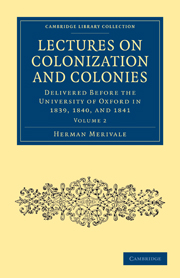 Lectures on Colonization and Colonies
Lectures on Colonization and Colonies Summary
The social characteristics of a community just formed, and engaged in subduing the powers of wild nature for the purposes of civilized man, depend partly on the circumstances in which it is placed, and partly on the condition and character of those classes of the population of the mother-country from whence the supply is derived.
In such a community, the mere wants of life are abundantly supplied, but not supplied without labour. There is none of that depressing poverty which elsewhere weighs down the energies of large masses of mankind; or of that almost equally depressing dread of poverty which perpetually harasses the minds of a class somewhat higher in circumstances, which produces in some an abjectness of disposition, in others an irritable and discontented temperament; and if it sometimes sharpens the intellectual powers, often does so only to the detriment of the moral character. On the other hand, every thing which adorns human life, every thing which stimulates the more artificial appetites of men, be they sensual or spiritual, is either difficult of acquisition or unattainable. The colonist has little temptation to long for the enjoyment of such superfluities; for the stimulus of envy is wanting: he does not see them heightening the pleasures of others, and therefore thinks little of them. During the first period of his conflict with the genius of the wilderness, his thoughts are necessarily intent on his immediate employment; afterwards, his daily labour for ordinary comforts is sufficient to occupy the common faculties of body and mind.
- Type
- Chapter
- Information
- Lectures on Colonization and ColoniesDelivered before the University of Oxford in 1839, 1840, and 1841, pp. 270 - 294Publisher: Cambridge University PressPrint publication year: 2010First published in: 1842
